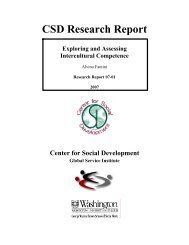Rediscovering social investment in developmental welfare state ...
Rediscovering social investment in developmental welfare state ...
Rediscovering social investment in developmental welfare state ...
You also want an ePaper? Increase the reach of your titles
YUMPU automatically turns print PDFs into web optimized ePapers that Google loves.
R E D I S C O V E R I N G S O C I A L I N V E S T M E N T I N D E V E L O P M E N T A L W E L F A R E S T A T E P O L I C I E S :<br />
B A C K T O T H E F U T U R E<br />
<strong>developmental</strong>ism would suggest that services related to the reduction of disease, creation of wealth,<br />
and improved capabilities broadly are a source of development with<strong>in</strong> and outside of <strong>in</strong>dividual<br />
households. This then justifies <strong>in</strong>-k<strong>in</strong>d benefits even if there is some short-term efficiency cost.<br />
The <strong>developmental</strong>ist perspective emphasizes universal benefits because they should result <strong>in</strong> higher<br />
uptake and lower moral hazard than means-tested benefits. While universal benefits entail a leakage<br />
of resources to the nonpoor, means-tested benefits are costly to adm<strong>in</strong>ister, tend to stigmatize the<br />
recipient, and impose costs on the claimant. Foremost among the costs associated with means<br />
test<strong>in</strong>g are moral hazard, lower uptake, probable <strong>in</strong>adequacy, and the costs associated with the<br />
occurrence of poverty. Esp<strong>in</strong>g-Andersen (2002, p. 25) suggests that ―dim<strong>in</strong>ish<strong>in</strong>g public health,<br />
pension, or <strong>social</strong> care expenditure is unlikely to produce any real cost sav<strong>in</strong>gs s<strong>in</strong>ce households will<br />
compensate with market purchase or with self-servic<strong>in</strong>g.‖ In other words, meager means-tested<br />
benefits ―will not result <strong>in</strong> lower net household money outlays‖ (Esp<strong>in</strong>g-Andersen, 2002, p. 25) but<br />
may result <strong>in</strong> unmet needs.<br />
Putt<strong>in</strong>g aside both the debatable economic assumption that public services tend to be delivered<br />
<strong>in</strong>efficiently and the normative assumption about the <strong>in</strong>herent value of choice (e.g., Streeten, 1993),<br />
one can argue that because means-tested programs typically result <strong>in</strong> low levels of coverage and<br />
limited access, there may be substantial future and cumulative costs (and foregone productivity)<br />
associated with means test<strong>in</strong>g. A related argument can be extended to family policy and ALMP as<br />
well. Developmentalism tends to see children primarily as public goods and production with<strong>in</strong> the<br />
home not simply as consumption but also as an <strong><strong>in</strong>vestment</strong> with positive <strong>social</strong> externalities<br />
(assum<strong>in</strong>g that under<strong><strong>in</strong>vestment</strong> is common). 57 F<strong>in</strong>ally, where perfectly competitive labor markets do<br />
not exist, there are substantial costs for the <strong>in</strong>dividual worker and the family and benefits of<br />
<strong>in</strong>novation, mak<strong>in</strong>g <strong><strong>in</strong>vestment</strong>s <strong>in</strong> ALMP justifiable.<br />
The <strong>developmental</strong>ist view of DWSPs, <strong>in</strong>clud<strong>in</strong>g the way <strong>in</strong> which they are comb<strong>in</strong>ed and <strong>in</strong>teract,<br />
differs from the ma<strong>in</strong>stream view and suggests effects that are not well-expla<strong>in</strong>ed by ma<strong>in</strong>stream<br />
economic theory. The <strong>developmental</strong>ist view of <strong>social</strong> policy suggests that maximum economic<br />
efficiency and poverty reduction should result from extensive universal benefits and <strong>in</strong>-k<strong>in</strong>d benefits<br />
<strong>in</strong> comb<strong>in</strong>ation with high overall expenditure. The benefits that are generated will outweigh any<br />
adverse effects of higher taxes or labor dis<strong>in</strong>centives <strong>in</strong> the long term. In this view, these policies<br />
should offer future <strong>social</strong> benefits as well as prevent <strong>social</strong>ly costly poverty.<br />
The <strong>developmental</strong>ist pr<strong>in</strong>ciples proposed earlier are consistent with and built on several economic<br />
observations, which are different from the economic observations of the ma<strong>in</strong>stream model (Table<br />
3). In the traditional economic view, <strong>social</strong> policy typically harms efficiency, whereas the pr<strong>in</strong>ciples<br />
that <strong>in</strong>form <strong>developmental</strong>ism suggest that <strong>social</strong> policy can make a net contribution to economic<br />
performance. In the ma<strong>in</strong>stream view, the general exception to the notion that redistribution<br />
through <strong>social</strong> policy is harmful is the case of market failures. However, there is little policy guidance<br />
57 As Thurow (1974, p. 194) notes, ―economists deal with efficiency differences between firms by rely<strong>in</strong>g on the sacred<br />
right of the <strong>in</strong>efficient to fail, but this is clearly an <strong>in</strong>adequate response to <strong>in</strong>efficient families. One of the key reasons for<br />
our general <strong>in</strong>terest <strong>in</strong> m<strong>in</strong>imum standards of liv<strong>in</strong>g …is our desire to prevent ‗fail<strong>in</strong>g families.‘‖ Treat<strong>in</strong>g <strong>in</strong>efficient<br />
families as economists treat <strong>in</strong>efficient firms would <strong>in</strong>cur high <strong>social</strong> costs and foregone <strong>social</strong> benefits, which signals an<br />
important role for prevention. In other words, as Kahn (2009, p. 7) has noted, child and family policy is no longer<br />
simply about problems of ―child sav<strong>in</strong>g‖ and ―child <strong>welfare</strong>‖ but rather about ―the limitless potential of each wondrously<br />
<strong>in</strong>dividual child.‖<br />
C E N T E R F O R S O C I A L D E V E L O P M E N T<br />
W A S H I N G T O N U N I V E R S I T Y I N S T . L O U I S<br />
39
















